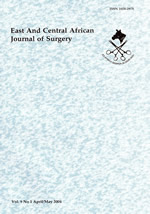
|
East and Central African Journal of Surgery
Association of Surgeons of East Africa and College of Surgeons of East Central and Southern Africa
ISSN: 1024-297X
EISSN: 1024-297X
Vol. 14, No. 1, 2009, pp. 130-134
|
 Bioline Code: js09024
Bioline Code: js09024
Full paper language: English
Document type: Research Article
Document available free of charge
|
|
|
East and Central African Journal of Surgery, Vol. 14, No. 1, 2009, pp. 130-134
| en |
Gastric Cancers At Kibogora Hospital
Ntakiyiruta, G.
Abstract
Background:
Epigastric pain is very common in our patients of both sexes and upper GI endoscopy is offered in very few hospitals. Antacids are routinely prescribed countrywide. Helicobacter pylori is very common in our region. Not only most clinicians lack the means to diagnose this infection, but they also cannot confirm its eradication. Many of our patients present with advanced gastric cancer with no prospective for cure. The aim of this study was to determine the frequency, the clinical presentations, the anatomical and pathological aspects and the management of gastric cancers at Kibogora hospital.
Methods:
This was a retrospective descriptive study of gastric cancer patients seen over a 1 year period from July 2006 to June 2007 at Kibogora hospital. Data was collected from records of patients with diagnoses of gastric cancers.
Results:
Thirty five subjects were diagnosed with gastric cancer during the study period. Their age ranged from 30 to 80 years with a mean of 55.8 years. There were more females 20 (57.1%) than males 15(42.9%) (F: M ratio = 1: 0.7). The commonest presenting complaints were epigastric pain (100%), vomiting (94.3%) and marked wasting (82.9%). The physical findings included features of gastric outflow obstruction (60%), epigastric tenderness (82.9%) and epigastric mass (37.1%). Diagnosis of advanced gastric cancer was made at endoscopy in 29(82.9%). Palliative surgery was done for 34 (97.1%) patients. Twenty seven (77.1%) patients markedly improved their quality of life and were discharged home. Only one patient died in hospital. The hospital stay ranged between 7 and 32 days with a mean of 14 days. All the specimens sent for pathology were reported as gastric adenocarcinoma of the intestinal type.
Conclusion and recommendations:
Gastric cancer is an important public health problem in our region. Clinicians need to adequately diagnose and eradicate H. pylori infection if the incidence of gastric cancer is to be reduced in this region. Surgery can only offer temporary palliation for advanced gastric cancer. There is a need for palliative care in this country.
|
| |
© Copyright 2009 - East and Central African Journal of Surgery
|
|
